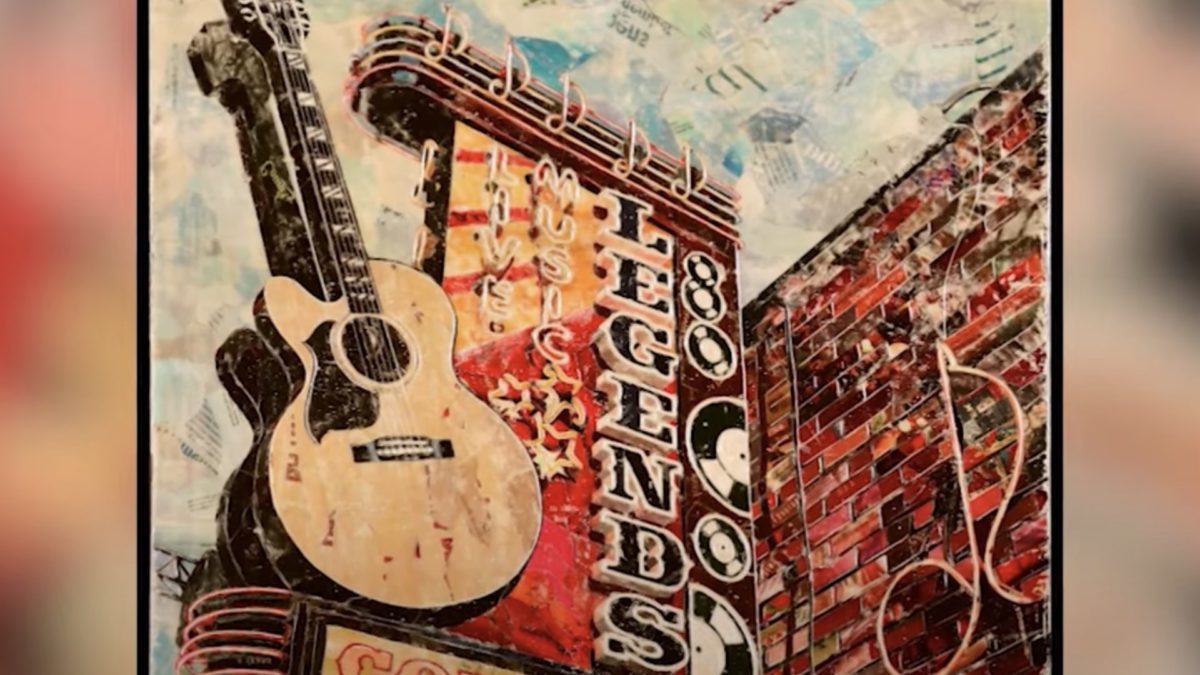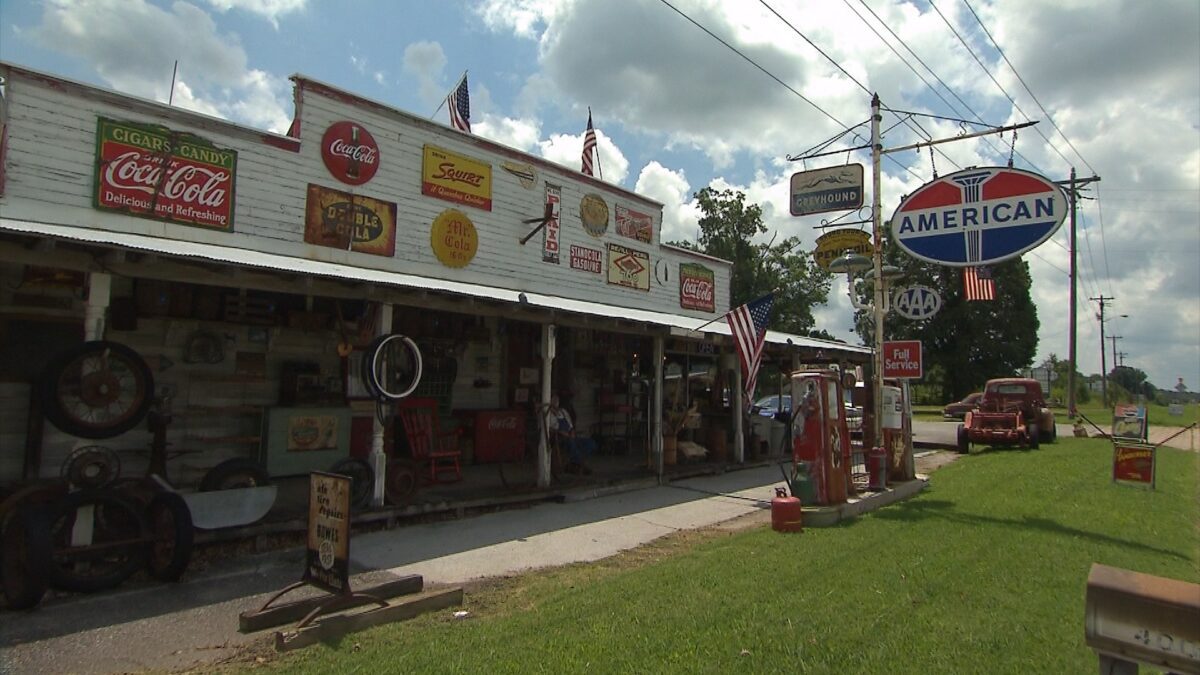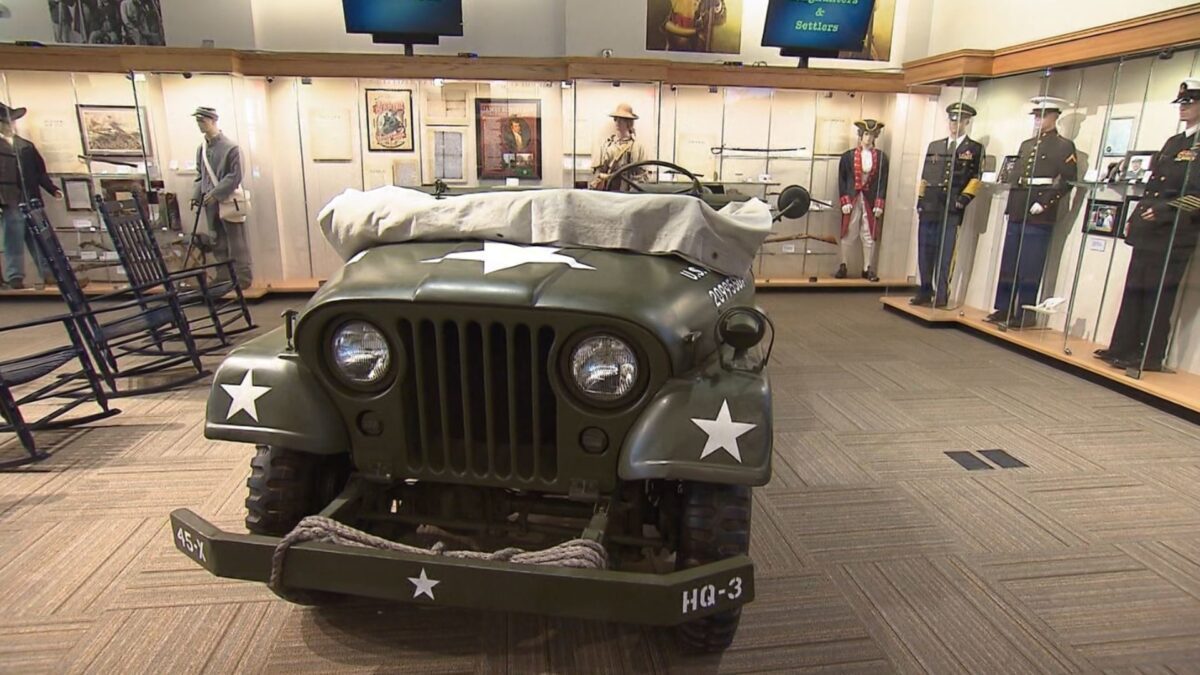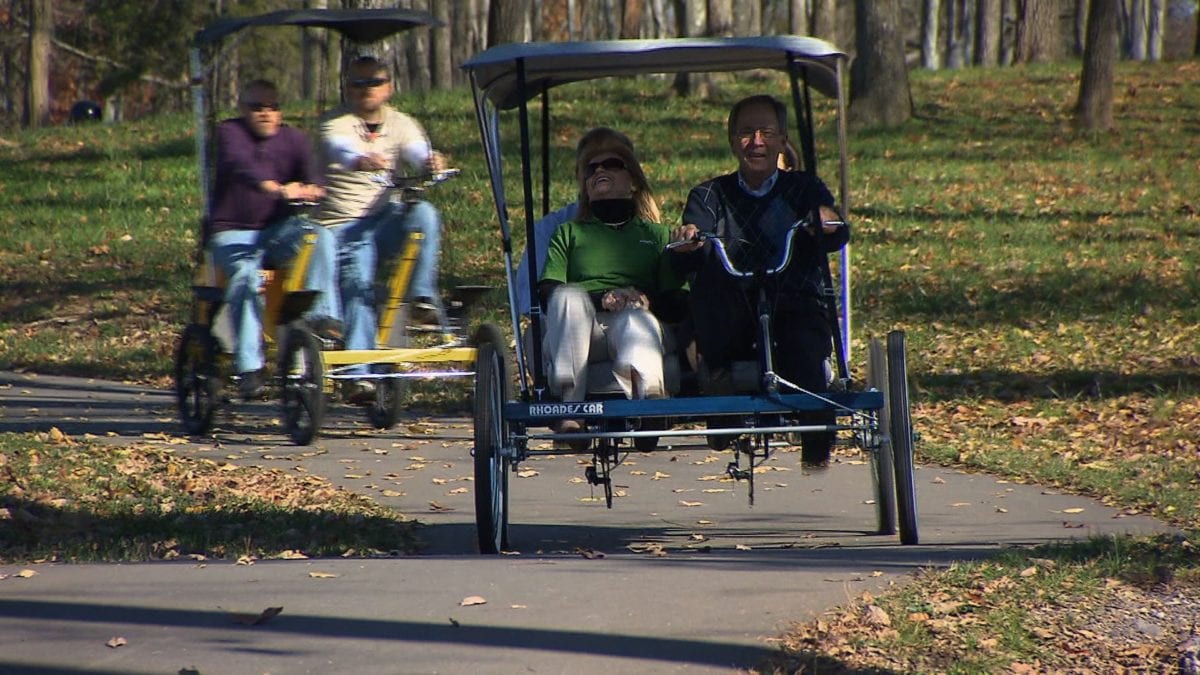- This time on "Tennessee Crossroads," you'll meet the Nashville artist who made a beeline to artistic expression then take in the Amish Depot in Etheridge. We'll explore some Wilson County military history of Lebanon and discover some bicycles that drive like cars in Hendersonville. Hi, I'm Joe Elmore. Welcome again to "Tennessee Crossroads." Sure glad to have you. We've showcased many artists over the years who use all kinds of materials to express themselves but this has gotta be a first. Cindy Carter introduces us to a Nashville artist who depends on insects for his medium. Well, let's see what this buzz is all about.
- [Cindy] Artist Randy Purcell makes several deliberate, painstaking even repetitive moves to bring his art to life and he wouldn't have it any other way.
- I feel like I'm more of a process artist. I love the outcome of my paintings but to me, it's more about these different steps that I have to take.
- [Cindy] Randy's steps lead him to end results like these. Randy is an encaustic artist which means he coats his birch wood backgrounds with bees wax and then burns in colors, textures and objects to create his artwork.
- [Randy] It's one thing I love about my technique is that the paintings look almost like a photo from a distance and as you get closer, you start seeing how it's dissected.
- [Cindy] Dissected upon closer inspection with the various techs and inks he pulls from the pages of magazines.
- [Randy] I've figured out that you could transfer an image from a magazine on top of bees wax. Something about that just thought was really cool.
- [Cindy] Randy's rather unique techniques starts with a photograph he uses as his template. He then cuts up that design into different shapes. Each template piece is replaced with an identically shaped piece of recycled magazine paper based down. So the magazine papers, ink or texts transfers onto the bees wax covered background. It's not the same as using the old paint and brush and that's the point.
- [Randy] I don't have a finished vision of what this piece is gonna look like because I don't know what textures and colors I'll run across in the magazines.
- "Veranda, cigar aficionado," even "Marie Claire." These are the magazines Randy uses in his work and he's very particular about his selections because not all magazine ink transfers the same.
- [Randy] I go through and I look for things that I feel fit with the image. Whether it be color or maybe a texture.
- [Cindy] The magazine paper transfer not only gives Randy's work a different look but thanks in large part to the bees wax, his art also feels different. For that reason, any old store bought bee's wax just won't do. Randy likes it natural and pure and local.
- [Ross] right here.
- [Cindy] Nashville beekeeper Ross Welborne is completely comfortable keeping the company of royalty. Ross carefully cares for dozens of beehives across the area which support his honey trade.
- Basically, every part of the beehive can be used for something.
- [Cindy] These hardworking employees keep Ross's East Nashville, Honeytree Meadery in operation and also allow him to do some sweet business with clients outside the meadery like Randy Purcell.
- After we harvest honey, there's lots of wax cappings as well and that makes for really good purified wax also. So it's basically high parts that we're not using anymore. We kind of take that wax and give it to Randy to harvest the wax out of it.
- [Cindy] Ross admits he never dreamed handing over some bees wax would lead to such a beautiful partnership.
- [Ross] Oh, I was floored when I first saw all of his work and like what he was doing with it. It's amazing, it's incredible. He's got something really special that he does for sure. We're really lucky to be able to be a part of it.
- [Cindy] It's a partnership Randy believes brings even more authenticity and dimension to his artwork.
- [Randy] With mine using pure bees wax, the reason I do is because it's tackier. It still has some impurities in it.
- [Cindy] A perfectly imperfect start and every step that follows for the self-proclaimed process artist is an exploration for something he hopes really reaches people. That others enjoy the destination as much as he enjoys this journey.
- [Randy] There's not a better feeling than to know that you created something that somebody would spend money on to keep it in their house to remind them of whatever that moment is when they walked up to the painting.
- Thanks Cindy. You know, it boggles the mind when you think about how much our world has changed over the past decades. Nowadays, you can get just about anything you want delivered to your front door. Not so long ago especially in the country, you were lucky to have a general store nearby for essentials. Well, as Gretchen Bates discovered that folks in Etheridge still count themselves lucky every time they walked through the door of Ike's Amish Depot.
- [Anna] We're kind of a curiosity shop. We have a lot of those pieces that maybe their grandparents might've had in their homes when it just kind of triggers that memory. It's a very comfortable feeling.
- [Gretchen] A comfortable feeling that perfectly describes the sensation upon entering Ike's Amish Depot, stepping back to a simpler time when this was an isolated country farm house and the home of Anna Gillespie's grandparents.
- My grandparents, they moved here in the late 30s back before we had the highway and we had all of these other stores. People would stop by for water and supplies on their way to wherever they were going and they said, "Why not just make it a storefront?" And so my grandfather got together with his wife's brothers, put a storefront on the building, kind of finished it out, got some stock for it and they turned it into a general store. And that was about 1942 whenever that happened and whenever my father inherited it, after he came back from the Vietnam War, he decided to kind of reinvigorate that feeling.
- [Gretchen] Anna's father turned it into a museum of sorts, a testament to life in the 30s and 40s.
- [Anna] One thing you all notice is of course, all the signage. My dad, he collects signs and he thinks that it's a perfect representation of what was important at the time, what people were marketing, what people really like looked for and so we have a lot of beautiful signage. One thing to note is that everything in the store is either the 1950s or older. So nothing in here is after 1950. And we actually still have our 48 star flag up there as kind of a memento from that early time when it first started as a store.
- [Gretchen] If the memorabilia isn't enough to tempt you, how about another popular period piece, the soda fountain.
- [Anna] This is an actually a 1930s soda pop station. So everything in here still functions like it used to. Same kind of ice cream you would have had back then. You can either get a scoop of it or you can make it into a root beer float or have a nice little milkshake.
- I like the milkshakes. I like to get ice cream cones a lot, mostly chocolate .
- And you said chocolate, all right?
- [Gretchen] Yes Ma'am, chocolate, vanilla, strawberry. Heck, I'll have one of everything but the Depot can do more than satisfy your sweet tooth. They have real stick to your ribs food. You probably shouldn't ask for a salad.
- I like to come here and get a fried bologna sandwich or a hamburger.
- [Gretchen] Fried bologna? Now you're talking.
- So all of the food that we serve here, just like all of the antiques that we have, just like all of the services we offer, it's like again, you're back in the 1940s. We have burgers and chips and things like that. Just simple food that'll fill you up and get you ready to go on your way.
- [Gretchen] On your way to explore places of interest and people of interest. I mean, there's a reason it's called Ike's Amish Depot.
- [Anna] A lot of our customers come just to enjoy the Amish community. You can visit their homes. You can see them make the bread. You can go to their fruit stands and talk with them and learn more about their lifestyle. It's just interesting to have that. It shows that special part of Lawrence County. We have these people here that do have that lifestyle that represents what Lawrence County used to be. We didn't use to have electricity. We used to go a lot slower. We didn't have our fast cars. We didn't have a highway and people like that do get left behind as we modernize and it's important for us to make sure we have resources in place for these people.
- The Depot has a history of serving the local Amish community, not burgers and shakes but transportation. You see, the Amish won't fly by plane but they will go Greyhound.
- [Anna] Amish, they're limited in their mobility. They can't drive. They can't use planes, anything like that and so the Greyhound bus station was a very necessary part of their life. And so my dad carries on the tradition of making sure that they have transportation and so it's an acting bus station for the Amish in our community.
- [Gretchen] Since the Amish don't own modern forms of transportation, the Depot kindly offers an old fashioned parking garage.
- We're the only Greyhound bus station that has a livery stable. Where would they keep their horse and buggy while they're away? Or they "park them" out in our livery stable? And of course, like local people will care for them. You know, their family and such will care for them and make sure that the horses are taken care of. And of course we monitor them as well. It's something that we do for them so that they feel comfortable and safe so that they can go and visit their family or anything like that.
- Every Saturday, my mommy gets us and she brings us here to get lunch sometimes and then usually we'll go outside and look at all the cars pass by and sit on the bench and talk to everyone.
- [Gretchen] Simpler times, simple pleasures, neighbor helping neighbor. That's the comfortable feeling you get at the Depot.
- The main reason that it was open was to support the community and that's still the main focus of this store today is to support the community we care so much about and to support the state that we love so much. And so not only can you come by here and get a fun little tchotchke for your friends, you can buy something that was manufactured just down the road. We carry things that were built and manufactured here in Tennessee and it's a sense of pride for our family to not only be a part of just the Lawrenceburg community but to be a part of the community of this state.
- Thanks a lot Gretchen. There are numerous military museums that pay tribute to defenders of our American freedom. Wilson County has a fairly new one that pays tribute to its own local veterans. Their own artifacts, uniforms and other elements that make for a very moving, very personalized experience. This eternal flame in Lebanon symbolizes the ongoing remembrance of Wilson County veterans. Those who serve their country and all USR forces including some who made the ultimate sacrifice. The Military Museum is the result of hard work donated by four architects and countless volunteers. Visitors can view a treasure of artifacts loaned or given by veterans from the area. All kinds of weapons from frontier days to the present. In addition to souvenirs, once belonging to the other side. The wall displays take you through a timeline of sorts including of course the war between the states, World War I.
- And of course, now when you get to World War II, we have a special connection because the headquarters for the maneuvers was here at Cumberland university from 42 to 44 and General Patton was actually here in Lebanon during that time period.
- [Joe] Our canvas Linda Grandstaff was responsible for curating each and every artifact that came in.
- [Linda] For the last six years it's kept me pretty busy recording all of the items that come in and getting the information about them and cataloging them all and giving them all a number and that's very important because if you just take things and lay them down, you have no idea where the come from.
- [Joe] Mannequins were specially ordered to represent real people dressed in their real uniforms.
- This uniform represents Kennyrich, one of our County commissioners and he served in the war of Iraq and he brought back several items.
- [Joe] Who's this?
- That's Emma Tapley. She served in the military. She's from here. She now lives in Texas but her family and all are still here but she's recently moved to Texas. The majority of our mannequin stand for real people that are from our County or connected to our County through a relative and we're very proud of that. And as I prepared them for display, it's almost like I got to know them personally. Dealing with their clothes and their history. That to me was very important and it was very touching to be able to have that connection.
- [Joe] The timeline continues with the Korean War, the war in Vietnam and finally, the Gulf Wars. The centerpiece of the museum is this 1965 Huey helicopter. It flew over 1800 hours carrying troops in and out of hot combat zones in Vietnam. It too has a true Wilson County connection.
- Though I always tell Miss Linda, the dummy looks a lot better than I ever looked in my life.
- [Joe] Former County Sheriff Terry Ashe served in the 101st Airborne Division in 1967 and 68 at the height of the conflict. He has three purple hearts to show for.
- Well, some old web gear I wore in Vietnam. I brought my Bible which I carried and I had a purple heart pinned on it for years and these are photographs of me. This could be me in this very helicopter here. We don't know for sure. My old helmet.
- [Joe] When the helicopter was brought in from storage in Nashville for display, Terry made a startling discovery. It's very likely he rode in it on a combat mission and during heavy enemy fire.
- It's very strange to see it here sometimes so you just wonder, "Is that the same one?" But there are certain holes in the floor inside it that lead me to believe it is same one.
- Bullet holes.
- Bullet holes, yeah. They're marked by the red tags on the floor.
- [Joe] The famous quote, "War is hell" is attributed to Civil War General William Sherman. Many of the veterans honored here went through hell to preserve the peace they cherished back home. This museum is dedicated to all those who served in any capacity.
- Everybody can't be in combat but those who are back home, the families and the other soldiers who are serving in all the branches, they make it able for you to be successful in your mission when you're deployed. So this is an honor of all deployed.
- It seems like bicycles have been around for ages and you'll find all ages riding them these days for the unhealthy way to reach their destinations. Well, Ken Wilshire found a place in Hendersonville where the bicycle, as we have known it, has evolved. It's a new way to get around.
- You know, it's simply amazing how many world changing inventions have been created in a barn like this one here in Hendersonville and that's exactly what Bill Pomoco is hoping for a vehicle that was invented here.
- Okay?
- I'm ready.
- And we're set . After you're speeding.
- [Ken] You see, Bill and his wife, Phyllis bought the Rhoades Car company several years ago.
- He could understand .
- [Ken] They make these carlike cycles sort of far more unique than anything out of Detroit.
- [Phyllis] Exhilarating .
- When I looked at this business, it was an 18 year old business that had achieved significant success and I looked and I thought, "I haven't been having fun lately and these are products that people love." And I thought, "Man, I have to do this." And we decided to start this business to sort of restart it.
- [Ken] Rhoades Car was the creation of company founder, David Rhoades who died in 2009. This was his first model. It looks like a car but it drives with the ease of a bicycle. David believed there was a strong market for this four wheel self-propelled vehicle. So with their experience in manufacturing, marketing and sales, Bill and Phyllis are continuing to pursue David's vision.
- David Rhoades was literally a genius when it came to putting things together. He tinkered for years with the whole concept of this four wheel. We still call them bicycles even though they're quadricycles. But he tinkered and tinkered in 1980s and in 1991, he decided to launch Rhoades Car out of his barn. So yeah, it's a very organic start.
- [Ken] But to fully complete the work family and to capture the technical and operational expertise of Rhoades Car, they needed master builder, Chris Spann and customer relations director, Beth Baker to stay on board to help them keep David's dream alive.
- I knew we had a great product. People when they see the bikes, they love them. So it was very sad at the moment. Yeah, it kind of looked hopeless and then Bill came along. So, he kind of saved us.
- I think David would be thrilled. He put many years into it and like he said, he was brilliant at his design and what he wanted to accomplish with it. And I think he'd be thrilled with the strides that we've made since his death in the company going forward while keeping true to what he originally designed to.
- [Ken] The Rhoades Car experience starts right here in Tennessee. There's no robotic assembly line, just the personal TLC it takes to produce each of the 10 residential and eight industrial models that are sold all over the world.
- [Chris] Historically, Rhoades Cars have been sold all over the world and we're really proud of that. Now, we don't sell a whole lot internationally. Most of our sales are here in the US and Canada but yeah, we're proud to say that there's a Saudi Arabian Prince somewhere riding two of them around. I know that and there are all kinds of people all over the world, riding a Rhoades Car. Our marketing is a whole lot different than it was several years ago because now we can target baby boomers. We can target 30 something eco-friendly population 'cause everybody's looking for alternative ways to get around. So yeah, the market is just endless for us and we haven't even talked about the industrial side of it. A lot of factories are going green too. So we developed an entirely new line just for factories where they can have their maintenance people driving around their facilities.
- [Ken] While there are a few parts that simply aren't available in the United States, our Rhoades Car is manufactured with materials from Tennessee suppliers and proudly carries the "Made in the USA" sticker on every vehicle.
- [Chris] Over 80% of every one of our components is made in the United States of America. That means we use the United States steel, imagine that, and we jig weld it. We have two facilities near our factory in Hendersonville, Tennessee that make our frames for us and then they're sent to a powder coater in Madison, Tennessee where they're powder coated and then all of our machine parts are made locally. Many of them are made in Clarksville at different facilities and so we're really proud of that. We reach out to American made companies to find our components.
- This could be addictive.
- [Ken] Obviously, Rhoades Cars offer far more than a fun, economical eco-friendly means of transportation. This family business is hoping that putting the leather to the pedal will truly have an impact on family life.
- Two thirds of Americans are overweight, obese and Tennessee is the fourth most weight challenged state in the nation. People need exercise but who has time, right? The Rhoades Car provides a way to do it both ways. We're getting exercise but we're having fun. We're spending time with people we care about. We're having a real conversation and I think it's so cool because families are fragmented and it seems to be a good way to get families together again.
- [Ken] When you jump on a Rhoades Car, it's such a comfortable position first of all and it's such a stable ride. So it's a little unlike riding a two wheel bike because you don't have to balance yourself but the nice thing about it is anybody can ride a Rhoades Car. It'll get you around 14 healthy miles per hour while you burn about 500 calories. You don't need a license, registration, insurance, inspection, oil or gas. You simply need the motivation to be leaner and greener and you just might find that Rhoades Car motivation is more fun than reaching your journey's in and it's all as easy as riding a bike.
- Well, I guess it's about time for us to wheel on out of here but not before the usual reminder, check in on our website from time to time, tennesseecrossroads.org. Follow us on Facebook of course and we'll see you next week.




